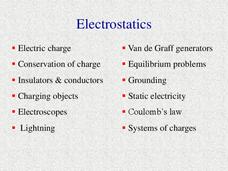Curated OER
Fossils
In this fossil worksheet, students match six terms with their definitions about types of fossils and they circle the proper term to make nine statements true about preservation of fossils.
Curated OER
Remembering WWII Through Memorials
Learners create memorials for lesser known WWII heroes. In this WWII lesson, students recognize the efforts of lesser know individuals and groups that contributed to the wartime cause. Learners work in groups to create a memorial for one...
Curated OER
Simple Machines Worksheet
In this simple machines worksheet, students match the simple machine to its definition. Students then identify the pictures by the type of machine it represents. This worksheet has 6 matching and 12 fill in the blank questions.
Curated OER
Layering the Soil
Students study and classify soil. In this soil science lesson, students classify soil by texture and size and study soil horizons. Students label the soil types with their specific soil horizon and learn about permafrost. Students...
Curated OER
How Do Airplanes Get Off the Ground
Students construct various types of paper airplanes, exploring action and reaction forces by conducting a paper airplane rodeo. Students then discuss how Newton's Third Law of Motion affected their planes.
Curated OER
Bonding Review
Students differentiate metallic, ionic and covalent bonding. In this chemistry lesson plan, students explain how these bonds are formed. They classify substances according their bond type.
Curated OER
The Judiciary in American History
Young scholars investigate the influence of political and societal forces on judicial decisions. Among the topics they examine are the selection of judges and the cause and effect relationship between politics, society, and the law. to...
Curated OER
Clay Boats
Seventh graders are given the opportunity to use model-building as a way to help comprehend the forces and phenomena at work in the world around them. They use both successful and unsuccessful models to make inferences, refine...
Curated OER
Impulse and Momentum
Students are introduced to the concepts of impulse and momentum and problem solving strategies for these types of problems. In groups, they discover the law of conservation of momentum and share their answers with the class.
Curated OER
Building Your Bridge Building Basics
In this technology learning exercise, students examine the basic principles of bridge building design in order to answer the nine questions with the help of the web links on page 2.
Curated OER
Getting Help, but for More Work?
Fifth graders discuss prior knowledge of slope and force. They relate steepness of slope to the force needed to get an object up the slope. Students read from their text the information about inclined planes. They answer the questions...
Curated OER
Migration and Technology
Pupils identify a technological innovation associated with human migration, either forced or voluntary. They explain how the migration was influenced by technology and how technology influences migration through a written essay.
Curated OER
Teaching the Tr'panier Trapezoid Kite
Students analyze how the parts of a system go together and how these parts depend on each other. They comprehend the forces in terms of strength and direction. Students observe, measure and describe weather indicators.
Curated OER
Bringing the Line to Life
Students use different types and lengths of sentences. They write with an insight of the stylistic aspects of composition. Students use precise language including adjectives, adverbs, action verbs and specific details that convey the...
Curated OER
Fluoride in Durango's Water-Helpful or Harmful?
Third graders complete several activities in their quest to find out about the addition of fluoride to city water. First, they create a guide sheet to help organize notes. The next two steps involve taking notes through guided practice....
Curated OER
Erosion in Different Soils [Erosion Races]
Fourth graders review how erosion can happen by wind, water, and gravity which they studied in previous lesson. They attempt to discover if all soils erode at the same rate. In small groups, 4th graders experiment with three different...
Curated OER
Levers
Fifth graders participate in a review discussion of the parts of a lever, resistance or load, fulcrum, and effort. Next, they complete activities at six experiment stations while collecting data that they share with the class. While...
Curated OER
Wind Power
What a wonderful way to explore wind power! Through this lesson, learners get a background in the history of wind power, create their own wind turbine, and the test their designs. This is a terrific way to tie scientific principles to...
Curated OER
Terrestrial Ecosystem Response to Climate Change
An extensive investigation of the Earth's climate changes awaits your environmental science classes. This top-notch presentation begins by looking at the history of Earth's climate and then predicts the impact on each major terrestrial...
Curated OER
Termite Biology
Young scholars explore the physical characteristics, distribution and habitat of termites. The lesson focuses on the termite as a social creature contrary to most other insects.
Urbana School District
Electrostatics
Why did lightning shock the man? Because it didn't know how to conduct itself. Presentation covers electric charges, insulators, conductors, electroscopes, lightning, generators, grounding, static electricity, and more. Presentation...
Curated OER
Earthquakes: Fifth Grade Lesson Plans and Activities
After learning about P waves and S waves, fifth graders view the intensity of earthquakes by examining seismographs and images of earthquake damage. Young scientists then forecasting future quakes by analyzing data about...
DiscoverE
Kinetic Sculpture
Let your creativity run wild. Scholars build a sculpture out of basic materials. These sculptures must be able to move in the wind (from an electric fan). However, they must also withstand the wind enough to not fall over—it's quite the...
Curated OER
The Glory That Was Greece
After finishing a unit on Greek history, it's important to test how much learners remember. This handout provides six different essay topics related to Greek History, influences, Athenian Democracy, or Alexander the Great. A rubric is...




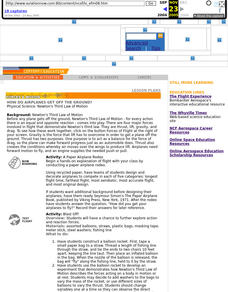


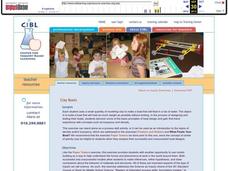



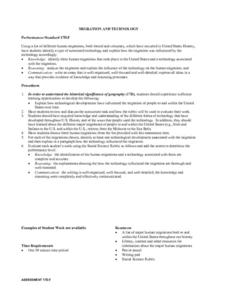


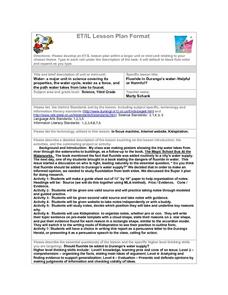
![Erosion in Different Soils [Erosion Races] Lesson Plan Erosion in Different Soils [Erosion Races] Lesson Plan](http://content.lessonplanet.com/resources/thumbnails/140405/large/cgrmlwnvbnzlcnqymdezmdmyos01nde3lxfmmzy0dc5qcgc.jpg?1414240121)




